|
|
|
Sort Order |
|
|
|
Items / Page
|
|
|
|
|
|
|
| Srl | Item |
| 1 |
ID:
153351
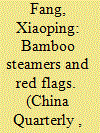

|
|
|
|
|
| Summary/Abstract |
This paper explores how the new Communist government developed a political consciousness of discipline and collegiality among traditional rural midwives in Chinese villages during the 1950s. It argues that selected traditional rural midwives were taught to observe discipline by attending meetings and studying, and to develop collegiality with peers through criticism and self-criticism of their birth attendance techniques and personal characters in short training courses from 1951 onwards. A legitimized midwife identity gradually formed in rural communities, but with it came conflicts and rivalry. By keeping these midwives under institutional surveillance and creating a dynamic and constant moulding process, the new government intended to foster professional and political discipline and collegiality within the group based on a normativized notion of selflessness performed within a changing series of indoctrination schemes that demonstrated continuity and complementarity and which I have described as common, preliminary, institutionalized, and dynamic schemes. This article examines how the state attempted to retrain marginalized and derided midwives with appropriate class backgrounds in order to incorporate them into the modern medical world, then still dominated by doctors and nurses with suspect class backgrounds. Ironically, in creating “socialist new people” to intervene in traditional rural birthing practices and introducing fee-for-service professionalism, the CCP accidentally created a degree of petit-capitalist thinking among women whose traditional mode of work may have been more selfless, thus complicating the process of indoctrinating selfless dedication.
|
|
|
|
|
|
|
|
|
|
|
|
|
|
|
|
| 2 |
ID:
137678
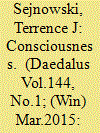

|
|
|
|
|
| Summary/Abstract |
No one did more to draw neuroscientists' attention to the problem of consciousness in the twentieth century than Francis Crick, who may be better known as the co-discoverer (with James Watson) of the structure of DNA. Crick focused his research on visual awareness and based his analysis on the progress made over the last fifty years in uncovering the neural mechanisms underlying visual perception. Because much of what happens in our brains occurs below the level of consciousness and many of our intuitions about unconscious processing are misleading, consciousness remains an elusive problem. In the end, when all of the brain mechanisms that underlie consciousness have been identified, will we still be asking: “What is consciousness?” Or will the question shift, just as the question “What is life?” is no longer the same as it was before Francis Crick?
|
|
|
|
|
|
|
|
|
|
|
|
|
|
|
|
| 3 |
ID:
086761
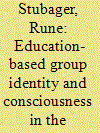

|
|
|
|
|
| Publication |
2009.
|
| Summary/Abstract |
The increasing importance of New Politics or authoritarian-libertarian values to electoral behaviour in advanced Western industrial democracies and the previously documented strong link between such values and educational attainment indicates that, contrary to the claims of some New Politics theorists, the ideological conflict is anchored in the social structure - in particular in educational groups. For this interpretation to be warranted, however, it should be possible to document the existence of education-based group identity and group consciousness related to the value conflict. The article develops indicators of the core variables out of Social Identity Theory. Based on a unique survey from Denmark, which includes the new set of indicators, the analyses show that members of the high and low education groups have developed both group identity and consciousness reflecting a conflict between the groups and that these factors are related to authoritarian-libertarian values. The results are interpreted as reflecting a relationship of dominance, which supports the view that the ideological conflict is structurally anchored.
|
|
|
|
|
|
|
|
|
|
|
|
|
|
|
|
| 4 |
ID:
086764
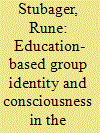

|
|
|
|
|
| Publication |
2009.
|
| Summary/Abstract |
The increasing importance of New Politics or authoritarian-libertarian values to electoral behaviour in advanced Western industrial democracies and the previously documented strong link between such values and educational attainment indicates that, contrary to the claims of some New Politics theorists, the ideological conflict is anchored in the social structure - in particular in educational groups. For this interpretation to be warranted, however, it should be possible to document the existence of education-based group identity and group consciousness related to the value conflict. The article develops indicators of the core variables out of Social Identity Theory. Based on a unique survey from Denmark, which includes the new set of indicators, the analyses show that members of the high and low education groups have developed both group identity and consciousness reflecting a conflict between the groups and that these factors are related to authoritarian-libertarian values. The results are interpreted as reflecting a relationship of dominance, which supports the view that the ideological conflict is structurally anchored.
|
|
|
|
|
|
|
|
|
|
|
|
|
|
|
|
| 5 |
ID:
106553
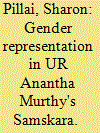

|
|
|
|
|
| Publication |
2011.
|
| Summary/Abstract |
Anantha Murthy's novel Samskara has achieved translated recognition nationally and internationally as a modern classic of Indian literature. Though it has generated much critical comment, insufficient attention has been given to its gender representation. Discussions of the novel's gender politics have either focused on its positive representations of feminine beauty and initiative or have taken a bleak view of its sexist arrangements. Re-scrutinising the novel's gender representation through culturally coloured lenses, this article uncovers other sites of gender discrimination and identifies a subtext that can offer a more positive inflection to Samskara's gender politics.
|
|
|
|
|
|
|
|
|
|
|
|
|
|
|
|
| 6 |
ID:
115257
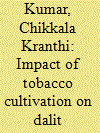

|
|
|
|
|
| Publication |
2012.
|
| Summary/Abstract |
This paper highlights the consequences of the economic and educational change among the Dalits of Karavadi. The tobacco cultivation that engages a large amount of labour has attracted the left political parties for the spread of their ideology and recruitment of party workers. It has helped in working against the practice of untouchability. Further, it has enabled the Dalits to be politically conscious and seriously participate in the political process. The growth of educational institutions in the village and the economic improvement have together helped the Dalits to assert their political and economic rights in the village. As a cumulative effect, the hegemonic inter-caste relations in the village have changed, though caste bias has not disappeared.
|
|
|
|
|
|
|
|
|
|
|
|
|
|
|
|
| 7 |
ID:
193304
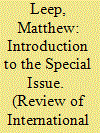

|
|
|
|
|
| Summary/Abstract |
The contributions to this Special Issue examine multispecies perspectives on the political dynamics of international life. Building on this theme, I consider the complex and manifold ways in which the subject of security can be understood in terms of more-than-human personhood. First, by thinking of more-than-human animals as phenomenally conscious persons, we might better appreciate the multispecies complexity of security as an agentic and affective experience. Second, attending to the spiritual character of certain indigenous articulations of personhood presses us to decipher how spiritual claims might inform moral and legal dimensions of multispecies security-seeking behaviour. To illustrate the significance of these moves, I first draw on more-than-human experiences of war, pathogenic viruses, and the global factory farm. I then explore conceptions of spiritual personhood in the context of Ojibwe responsibilities to protect wolves. These perspectives on personhood demonstrate possibilities for cultivating greater interest in the multispecies experience of security.
|
|
|
|
|
|
|
|
|
|
|
|
|
|
|
|
| 8 |
ID:
161634
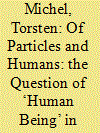

|
|
|
|
|
| Summary/Abstract |
Drawing on quantum theory, Alexander Wendt’s Quantum Mind and Social Science suggests a thought-provoking reorientation of the social sciences. Addressing some of the key assumptions in Wendt’s account, this article argues that despite a quite elaborate and eloquent development of a monist ontological position, conceptual discussions remain solely focused on the nature of beings and neglect wider implications for the nature of being, particularly human being, that arise out of its abandonment of a substance ontology.
|
|
|
|
|
|
|
|
|
|
|
|
|
|
|
|
| 9 |
ID:
152198
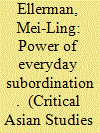

|
|
|
|
|
| Summary/Abstract |
This paper examines how Chinese female migrant domestic workers are influenced by different forms of subordination; how norms, practices, and power relations enable and legitimize their subordination; and the ways in which subordination elicits compliance while silencing and disempowering the workers. I advance a new perspective on subordination, linking forms of subordination with forms of consciousness. Consciousness of one’s treatment and how one is changed by it informs the decision of whether to remain silent. Compliance, silencing, and disempowerment are facilitated by recognizable and subtle forms of subordination that can directly control individuals’ actions, shift their perspectives, and cause them to act against their own interests. When workers are not conscious of the insidious impact of subtle subordination upon their attitudes, perspectives, and behavior, they are far less likely to resist.
|
|
|
|
|
|
|
|
|
|
|
|
|
|
|
|
| 10 |
ID:
161635
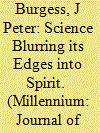

|
|
|
|
|
| Summary/Abstract |
Alexander Wendt’s 2015 Quantum Mind and Social Science is nothing if not true to its aims. Through rigorous argumentation and solid erudition it draws the logical lines from the state-of-the art of quantum theory to social reality. The result is a set of conclusions about the nature of social life that appear both plausible and convincing. And yet the voyage comes at a high price. For in order to reach its goal, Wendt’s reasoning blithely navigates around most traces of meaningful human experience or social relation that do not already hold social scientific currency. It avoids at some pains the deeply spiritual connections that have been made tenable by growing literature connecting Eastern religious thought and theoretical physics. It ignores any and all indices that might point to an explanation of the remaining quantum riddles through a rebooting of our ontological assumptions about quantum theory. Caught in a narrow understanding about question of being as the question of ‘which being’, Quantum Mind and Social Science thus misses the chance for truly insightful discovery about the nature of social relations.
|
|
|
|
|
|
|
|
|
|
|
|
|
|
|
|
|
|
|
|
|